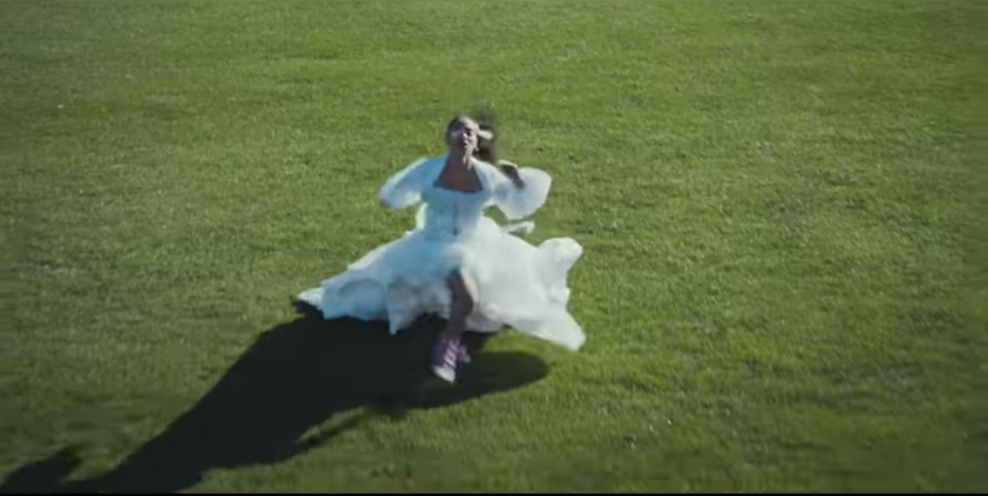As the third single and video from FKA Twigs’ second studio album in five years, Magdalene, “Home With You” offers surreal visuals speaking to a different emotion than “Cellophane” (the video that makes FKA probably more feminist than Simone De Beauvoir for debunking the tragedian myth of the stripper–in a slightly less mainstream way than Hustlers). The one that seems to inevitably drive a person back to the sanctuary of the place from whence they came. For most who flee to the city, that place is the suburbs. A milieu they once sought to abandon as soon as the moment arrived when they could, only to realize there was a method to their parents’ madness in sequestering themselves there. Away from the ills of the big bad city.
Directed by FKA Twigs herself, a blurred and distorted opening in an underground club setting sets the tone for the strange and inexplicable goings-on in one’s life after too much time spent in a place like London. It is usually during these absurdist moments that one has “the epiphany.” In this case, while wearing a more futuristic version of Madonna’s Madame X patch (almost sort of like a take on half a pair of sun tanning goggles), FKA has it in this sweltering basement backdrop. Among her most profound revelations include, “The more you have the more that people want from you/The more you burn away the more the people earn from you/The more you pull away the more that they depend on you.” And even if she has all the numbing distractions of a thriving metropolis at her fingertips (save for novocaine to numb the pain), something within her–a self-preservation instinct that kicks in right before it’s too late–sends her fleeing from the club (a sign urging, “Please Leave Quietly” in the background–as though to beg her not to tip anyone else off in the club to the fact that city life is bullshit).
As she gets into the driver’s seat (at least by British standards of where it should be) of a car waiting outside with three other passengers–all wearing tricked out eye accessories–her sense of freedom becomes manifest in lifting both of her arms into the air, as though saluting the universe. Joined in the same motions by her friends, the effect of a car driven by no one heightens the sense of the video’s simple surrealism. As the day breaks, she pulls into the driveway of a house in the country, leaving her sleeping companions behind in the vehicle. Her eye patch is quickly replaced with a Band-Aid as she dances with others in wedding dress-evocative white garb amid the full clotheslines. The simplistic beauty of a home in nature already seeming to have a positive effect on her. For as FKA Twigs described of the song, “You can take the girl out of the suburbs but you can’t take the suburbs out of the girl. “‘Home With You’ reinforced my recurring suspicion that when I’m in doubt, I should follow my gut and go home.”
After resting her head on some wise woman’s lap and getting some sort of laundry spell put on her, FKA runs into the woods (in a shot that makes one think of Runaway Bride) and wades dramatically though a riverbank for an added biblical effect. She reaches a well she seems to be climbing up until we see that she’s pulling another version of herself–her child incarnation–up out of it. She, too, wears the same Band-Aid on her eye as FKA, sings, “If you’d have just told me I’d be running down the hills to be with you/I’d be running down the hills to be with you/I never told you I was lonely too.” This reconnection with her past self serves as yet another touchstone for why she is bound to the feeling of serenity in the natural setting of her origin, her true home away from city life and all of its pressures. As she lifts her dress slightly to show her other eye on her stomach (it’s a real “Bedtime Story” video moment), we see there is some arcane knowledge she has apprehended at long last. Healed both mentally and physically.
In Luke 8:2, it was said, “And certain women, which had been healed of evil spirits and infirmities, Mary called Magdalene, out of whom went seven devils.” For FKA to title the album Magdalene (and name check her in this song) speaks to her own overcoming of the agonizing physical infirmities she endured during the years between her first record and this sophomore one. Years during which the city just didn’t hold the same appeal.



















